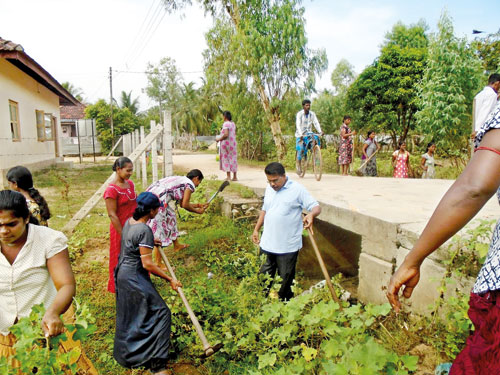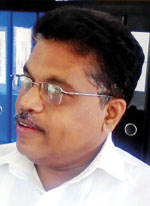Sunil’s fluent knowledge of Sinhala and Tamil helps in reconciling communities

Sunil on the field
It took much longer for Sunil Dombepola to complete his public administration degree from the University of Sri Jayawardenapura because the course of study unfortunately fell into the period of the JVP revolt in 1987-1989. To rub salt on the wound, he was also in detention for two years and ended up with many other undergrads studying diligently in prison and also doing their exams there – a lesson for today’s combative undergraduates!
Today Sunil is a matured, experienced field worker and administrator in the country’s non-governmental arena and passionate about not only his job but also the recipients of the work undertaken by Palm (Participatory Action & Learning Methodologies) Community Development Services Company which works in the North and the East of Sri Lanka, since the tsunami of December 2004. And unlike any other NGO CEO or administrator, the former Ginigaththena village lad is willing to rough it out on the field, often preparing his own lunch early morning, eating on the field and sleeping in an office room along with other field staff!
The organisation is part of the Palm Foundation launched in the early 1980s by a group of Dutch volunteers, headed by Ms. Natascha Sennema to support programmes in the Nuwara Eliya district serving the plantation and rural communities.
Raging conflict
After the island’s raging ethnic conflict ended in May 2019, the challenges to the NGO community, civil society groups and community (village-level) organisations are many. “The biggest challenge is getting international funding for project work as Sri Lanka is a middle income country and the war is over now. We need to work out ways of self-financing projects and as per our organisation, we are working on some self-financing mechanisms,” Sunil – Executive Director of Palm East, who has worked in the NGO sector for 22 years, told the Business Times in an interview in Colombo during one of his working visits to the city. “Promoting eco-tourism through our lagoon resource management projects is one such area,” he added. Partners of Palm East projects include the Sri Lankan Government, USAID and UNDP among many other institutions.
Discussing the organisation’s projects, Sunil said that in 2005 Palm provided dug wells for tsunami-affected families in Ampara but later found it was not sustainable since during the dry period there’s no water. Also the water quality is not good and for this reason the 180 wells had Palm notices stating that this was not good for drinking. “Our cost benefit analysis also showed this was not a sustainable venture,” he recalled.
The community-based organisation then moved into the provision of pipe borne water for poor and low income families, helping a total of nearly 11,000 families in all its drinking water projects. Palm also works in the area of WASH – water supply, sanitation and hygiene and mostly with female headed households with 30 per cent of the families in Batticaloa headed by war widows, providing livelihood assistance.

Sunil Dombepola
Palm is also involved in helping lagoon fishermen in Batticaloa, rehabilitation of small lakes for cultivation and a sustainable lagoons and livelihood project with nine lagoons in north and east with around 8000 lagoon fisherfolk.
Sunil’s beginnings in community-based work was influenced by some tragic experiences during the 1983 riots when as a 18 year-old schoolboy he saw many Tamils killed near his Ginigaththena home while his family helped protect Tamils in their home. “I was horrified by the incidents of violence and wanted to do something towards reconciliation,” he recalled. Later learning Tamil and now fluent in the language, the chance came when Palm expanded its work in the East.
Studying in jail
Relating the issues that he faced in the university, Sunil recalled how as an associate student union leader he led a protest over the killing of an individual by para-military forces during the 1987-89 JVP revolt. Several students including Sunil were detained and they spent two years at the Boosa detention camp. “There were 39 students – doctors, engineers and management and arts undergrads being detained in jail at Boosa along with me. We formed a ‘learning society’ which was made up of students from five universities. (Then) Minister of Higher Education Lalith Athulathmudali came to see us and instructed the authorities to provide us with books and playing material like carrom boards. He also helped to organise lecturers to come to the camp to teach us. Medical students were taken out in escort to labs for clinicals,” Sunil said adding that their first and second year exams were done while in detention.
At the Uranikottukal lagoon in Pottuvil, Palm helped the fishing folk to modify four boats as safari boats to take tourists on lagoon expeditions. These are all rowing boats – engines are not permitted on the lagoon – with two boats connected together with a platform in the middle. A rest hall has also been made under this eco-tourism project with Palm getting part of the income (as a self-financing mechanism) in a profit-sharing model with the community that is working well. The organisation is also discussing with a Sri Lankan dairy company to set up a collection centre and chilling plant, again as a profit-sharing model with the eastern community.
Sunil’s wife is a director of education in the Hatton region and the couple has an 18 year-old son and 12-year old daughter. Starting off his Palm career in the Nuwara Eliya office, Sunil – with his competence in both Sinhala and Tamil languages – was assigned to handle the post-tsunami project in Batticaloa and was to return to his hometown on completion of the 20-month project. However when another project immediately followed in the East, he remained in Batticaloa and since then has also seen the office expand work to the North.
The energetic NGO worker loves to work in the field. “Though I should be in the office and allow our five managers to work, I like to work in the field,” he says adding “I always be a field worker”. Nowadays Sunil says his workload comprises 50 per cent administration and 50 per cent field work.


